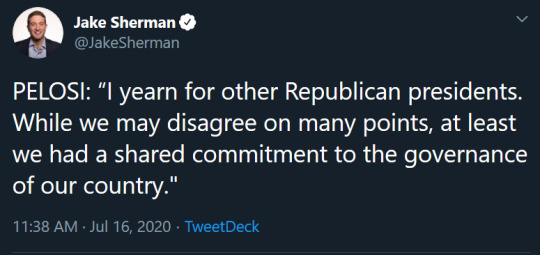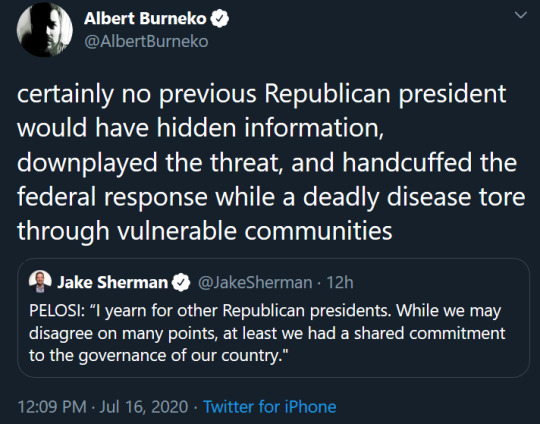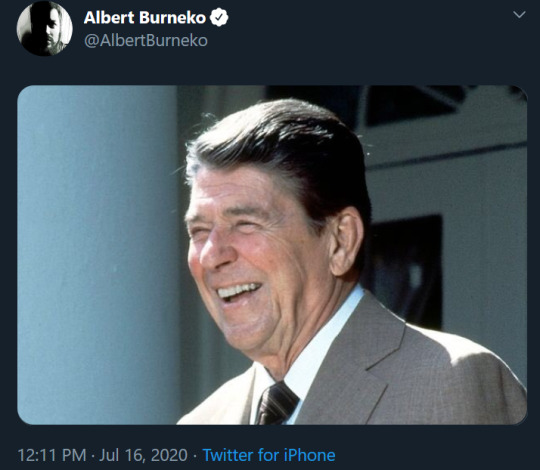#also: with a devotion that borders on unwise but will pay off in the end (achi will love him back & i get to watch it)
Explore tagged Tumblr posts
Text
slipping into another cherry magic thailand rewatch the way karan slipped into love (by accident, because i yearn for kindness)
#also: with a devotion that borders on unwise but will pay off in the end (achi will love him back & i get to watch it)#*#cherry magic th#cherry magic thailand
15 notes
·
View notes
Text
When some economists advised sending every American a check, Pelosi shot that down, arguing against money for millionaires. This culminated in a means-tested $1,200 stimulus payment. You only got the money if your earnings were under $100,000 per year, based on earnings data as far back as 2018. This deprived people who subsequently may have lost their job from getting relief.
A separate legislative response purported to provide sick leave to workers, except employers with more than 500 workers and those with fewer than 50 were exempted from the requirement. When asked about this, Pelosi said large employers should provide sick leave themselves, without government subsidies (workers needing paid time off might not have minded). Meanwhile, several legislative efforts promised free COVID-19 testing for all, but the health care industry has managed to find loopholes there too: Reporters keep finding people paying thousands of dollars.
Meanwhile, while Pelosi took the lead on the initial, smaller bills, she allowed Mitch McConnell to write the vehicle for economic relief, known as the CARES Act. McConnell casually drew up a $4.5 trillion “money cannon” corporate bailout, which rapidly rescued the investor class before it was even spent. Who drafts the baseline legislation makes a big difference: If Pelosi had written the CARES Act, it could have included such ideas from her caucus as government-provided payroll support, increased food stamps, guaranteed vote-by-mail to ensure voting rights during the pandemic, significant state and local aid, free coronavirus treatment, assistance for the U.S. Postal Service (which may go belly-up come September), a national contact tracing program, and much more. Instead, they just got to tweak McConnell’s work, without altering its tilt toward the powerful.
Relief for individuals, like the one-time stimulus checks and boosts to unemployment insurance, was clumsily implemented and, most important, temporary. Pelosi and Schumer touted stringent corporate-bailout oversight, but Trump fired the inspectors general charged with monitoring it, and Pelosi and McConnell spent months failing to name a chair of the only entity Trump couldn’t meddle with, the Congressional Oversight Commission.
These failures were Pelosi’s alone. She deliberately slowed allowing members to vote remotely or through a proxy while lawmakers were locked down at home. Because of this, during the crucial months of March and April, Pelosi became a one-woman House of Representatives, unilaterally writing legislation or negotiating with Republicans, and presenting the finished product to House members, take it or leave it. This effectively disenfranchised hundreds of millions of Americans and limited the Democratic Caucus to issuing press releases while Pelosi did the work of governing. But this power grab wasn’t put toward anything resembling a clear goal.
After four bills passed, Pelosi got around to putting together a bill, the HEROES Act, which included all of the important pieces she deferred in other legislation. But by this time, Republicans had their corporate bailout and could ignore further efforts. The HEROES Act was another unfocused wish list, which Democratic leaders telegraphed as a messaging bill to set up future negotiations. As of press time, those negotiations hadn’t begun.
The bill also included random giveaways. It extended small-business grants to K Street lobbyists, even though lobby firms were still as busy as ever trying to win perks for their clients. This would amount to Congress donating to the groups that devise campaigns intended to influence them, and as former members often gravitate to K Street, would have lawmakers handing over money to their future employers, which is about as corrupt as you can get.
UNDERLYING THIS ALL, incredibly in the midst of a crisis, was a Pelosi tendency that had grown over the years: obsessive concern with deficits. Pelosi rolled back student debt relief in the HEROES Act after learning that it would cost $100 billion more than expected. This was a $3.2 trillion messaging bill not designed to become law, yet an additional 3 percent cost was considered unacceptable. Pelosi also declined to add “automatic stabilizers” that would maintain expanded benefits until economic stress dissipated, blaming a Congressional Budget Office scoring quirk that made the cost appear artificially larger.
So with over 30 million out of work, the important thing to Pelosi was that her pie-in-the-sky, going-nowhere bill was "reasonable,” based on some ineffable standard of reason. It matches the worldview of a Democratic leader who, just two years ago, made a lugubrious elegy on the House floor after the death of Pete Peterson, who bankrolled the deficit hysteria industry for decades and relentlessly targeted Social Security for cuts. ([Author] Ball does reveal that Pelosi told Obama during his “grand bargain” talks that she would support his aims, “even if it meant agreeing to entitlement cuts.”)
Devotion to deficit hawkery in normal times is unwise policy. It’s downright fatal during an economic crisis, where relief could be yanked away from needy families prematurely simply because of an unwillingness to challenge the CBO’s scoring model. But here we finally see the contours of Pelosi’s governing framework, not just on the budget, but on everything.
Pelosi believes that the nation’s resources are scarce, and what sadly passes for the modern welfare state must be protected at all costs, rather than raised to greater heights. The goal is, at best, a less bad world than Republicans want. It’s a defensive crouch dating back to Pelosi’s initial entry into Congress under President Reagan, and it has dominated her thinking ever since.
Progressives who dream too big are to be sat in a corner, and anti-government conservatives are to be bargained with and mollified. Official Washington’s approval is craved. Pelosi hosts an annual ideas conference at her own vineyard for a group of elite donors. That’s who gets to scale the fortress she has built around her desiccated ambitions. Her thoughts today on activism date back to something she said during her first campaign: “Someday they will realize just how insignificant they are.”
Pelosi demands total control; you can argue that she never groomed a successor for this purpose, to keep everyone reliant on her. She finds this to be the best method to gain leverage over the legislative process. But to what end is this leverage employed? Pelosi fights intensely to obtain power, but she seems toconsider power so fragile and fleeting that it shouldn’t be used for very much.
Democrats captured the House in the 2018 midterms on a promise to counter Trump’s lawlessness and corruption. Yet today we have an unchecked kleptocracy, with very little sustained oversight coming from the House. Trump’s wars were not discontinued and his border camps were not shut down; even his border wall, which caused a prolonged government shutdown in 2019, was still funded through repurposing military money, something the House has never attempted to reverse.
Now, we have a crisis recovery limited to the wealthy and connected, threatening economic disaster for ordinary people. Leverage for a better solution was squandered. John Boehner was an incompetent leader, but even in divided government, he succeeded in his caucus’s primary aim of cutting spending. During his tenure, public investment fell to its lowest portion of GDP since Eisenhower. Pelosi is clever and sharp, yet astonishingly little has changed.
Pelosi’s deal to gain the Speaker’s gavel a second time requires her to step down after 2022. If Joe Biden wins the election, and Democrats gain a governing trifecta, she’ll have one final chance to write her legacy. The circumstances dictate a far different course than she appears capable of steering. The past 40 years have seen endless stagnant wages, sinking economic mobility, collapsing trade unionism, and soaring income and wealth inequality, to say nothing of even more enduring structural racism and the persistent black-white wealth gap.
David Dayen: A Leader Without Leading
The American Prospect | July 2020




#nancy pelosi#news#2020 us presidential election#2020 us election#us congress#coronavirus#us history#you can't trust the democrats ever#democrats#reagan era#nancy pelosi must go#the progressive movement
0 notes